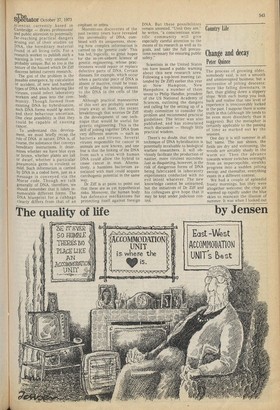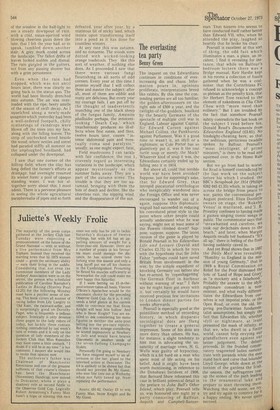Country Life
Change and decay
Peter Quince
The process of growing older, somebody said, is not a smooth and uninterrupted business, but a succession of jolting descents: more like falling downstairs, in fact, than gliding down a slippery slope. With each bump you look back and realise that one level of experience is irrecoverably locked in the past. I suppose there is some truth in this (although life tends to be even more disorderly than it suggests). But the metaphor is certainly applicable to the passing of time as marked out by the seasons.
One day it is still summer in all but name. The sun shines, the fields are dry and welcoming, the woods are amiably shady in the warm air. Then the advance towards winter switches overnight from an imperceptible, stealthy progress into a sudden jolting swoop; and thereafter, everything exists in a different context.
We had a couple of splendid frosty mornings, but they were altogether welcome; the crisp air warmed up rapidly under the blue skies to maintain the illusion of summer. It was when I looked out
of the window in the half-light to see a steady downpour of rain, with a cbld, mean-spirited wind blowing cheerless gusts down the lane, that I felt the year had, so to speak, tumbled down another stair. A grey murk oozed across the landscape. The fallen drifts of leaves looked sodden and dismal. The rain gurgled in the gutters, not from any passing shower but with a grim persistence.
Even when the rain had stopped, which was not until hours later, there was clearly no ,going back to the status quo. The world had been literally drenched into autumn. The air was overloaded with the ripe, beery smells of the season of swift decay. As I squelched along a newly-made quagmire which yesterday had been a well-ordered footpath, chilly scatterings of raindrops were blown off the trees into my face, along with the falling leaves. The strip of unchecked weed beside the wood, where nettles and sorrel had paraded stiffly all summer on the unploughed headland, had collapsed under the downpour.
I saw that one corner of the hilltop field, where the clay has long defied the farmer's efforts at drainage, had overnight resumed its winter form: a pool of opaque standing water. I was not altogether sorry about this I must admit. There is a perverse pleasure in seeing the whole agricultural paraphernalia of pipes and so forth defeated, year after year, by a mutinous bit of sticky land, which insists upon transforming itself into a pond as it has done for countless winters.
At any rate this was autumn, and no nonsense. The woods were dotted with wicked-looking orange toadstools. They like this sort of weather, if nothing else does. As I proceeded I saw that there were various fungi flourishing in all sorts of odd corners. Every year at this time I promise myself that I will collect these and master the subject: after all, most of them are edible and many are delicious. But every year my courage fails. I am put off by the thought of inadvertently munching one of the black sheep of the fungus family, Anianita phalloides perhaps, the innocentlooking ' Death Cap,' which treacherously produces no ill-effects when first eaten, and then, twelve hours later, causes " intense abdominal pain and eventually coma and paralysis," usually, as one might expect, fatal.,
Field mushrooms I can tackle with fair confidence; the rest 1 cravenly regard as interesting variations in the landscape, which appear mysteriously as the summer fades away. They are a part of' the autumn scene. The trouble is that they are too autumnal, bringing with them the hint of death and decline, like the cheerless rain, the nipping wind, and the disappearance of the sun.



































 Previous page
Previous page